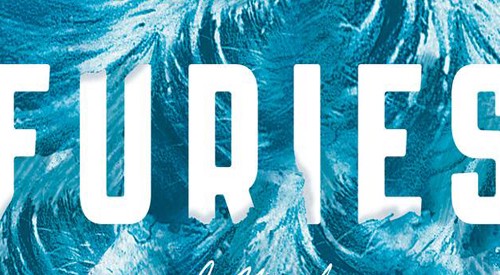Reading Lists
Ten Great Punk Songs Inspired by Books

This summer’s release of the new Titus Andronicus record The Most Lamentable Tragedy — described as “a work of fiction” by the punk band’s singer/songwriter Patrick Stickles — in the form of a five-act, 3xLP rock opera, reminded me that punk rock has a surprisingly literary history. Stickles, who named his band after Shakespeare’s most violent play, wears his literary influences on his sleeve like no one else. He even admitted on a WTF podcast that the band name and other references came from an urge to show off all the books he read in college. Fortunately, his band’s music is far from pretentious. They’ve made some of the most fun, refreshing, and honest records to come out in recent years. On the flipside, there’s the song below from last year’s Single Mothers record, Negative Qualities, which has a line that calls out bibliophile show-offs: “At least I don’t pretend my whole life is tied together by bookends.” Bandleader Drew Thompson is just as critical of the punk scene as he is of literary types: “There’s always character archetypes,” he said in a Pitchfork interview, “and most of these songs are just about hanging out at a show and having shitty conversations with shitty people.” After hearing “Marbles,” I couldn’t help imagining these caustic remarks directed at the literary scene.
It was only a matter of time before my conception of an inter-scene battle ran its course, and I started to remember other great book-inspired songs from punk history. Some of these go beyond literary references, using ideas from books to work through basic punk rock themes of nihilism, distrust, failure, insecurity, and the evils of late capitalism, while others are a bit more light-hearted. Then there’s Iggy Pop’s Houellebecq-inspired record Preliminaires, which sounds like it came from a different planet.
Single Mothers
This Four-piece from London, Ontario formed in 2011, then went on hiatus so that the singer could pursue gold prospecting in northern Canada.
When I first heard this track, its burst of pointed anger and self-hatred reminded me of punk’s mechanism of attraction: Here’s a thing that sucks; this is what sucks about it; this is why I suck, too; and this is what makes it okay. In the case of “Marbles,” the object of derision is the McSweeney’s-hoarding, typewriter-obsessed lit poser, with whom the singer painfully admits to sharing the same crippling level of self-awareness. Or maybe he’s just pissed because his girlfriend spends more time talking with her friends about her thesis than hanging out with him.
Herzog
Weezer- and classic rock-inspired band from Cleveland with punk energy.
Given the multiple references to books and writing on this band’s record, I like to think that they named themselves after the Saul Bellow character, though they could just as easily been thinking of the filmmaker of Stroszek. Their songs have a lumpy, sad resignation that shares a strand of DNA with Bruno S., though it’s not manifested to the same abject degree. “Mad Men” could be about the alienation felt in Cleveland by average rocker dudes when comparing themselves to the characters in the Mad Men TV show; the certain failure they would face if they tried to write songs commercially for other people to sing; the belief that they could make money by moving to New York to work in publishing now that they’ve stopped trying to be writers; or all of the above. “Greet the morning with a sigh/In the city daily life/Place where dreams go to die/Watch your twenties as they slowly pass you by.”
Also see “Henchmen”: “I’d rather stay at home and read than fuck up everything some more.”
Iggy Pop
“Jim” to those who go way back with him, Iggy can also be seen again as front man in the last incarnation of The Stooges, Detroit’s most wild and visionary proto-punk band.
Iggy read Michel Houellebecq’s futuristic novel The Possibility of an Island and then went into the studio. I’m glad he did, because I’d chosen that book as an introduction to the controversial author and struggled through it, constantly getting lost in the switches from past to present and between the two clones of the protagonist, both of whom are named Daniel. Sometime after I’d finished it, I listened to Preliminaires, Iggy Pop’s adaptation of the novel in a jazz, spoken word, electro-pop, and punk format, and suddenly the book made a kind of sense. This track channels the voice of Daniel1, and it echoes Houellebecq’s central theme of hedonism, condemning it as both sickening and unavoidable. Also, here’s Iggy reading from the book in his amazing bedtime story voice: “Machine for Loving.”
Titus Andronicus
Based in Brooklyn by way of New Jersey, Titus Andronicus co-runs the DIY show space Shea Stadium with fellow punks The So So Glos.
Cleveland Bound Death Sentence
A punk rock supergroup of sorts, with Dillinger Four’s Patrick Costello on vocals. Active in the late ’90s and again in 2004 for this record.
CBDS Lyrics:
She was sitting to my surprise out on the steps when we arrived. She smiled at us (she winked at me). See life’s too short but sometimes sweet.
Paley, from “Wants”:
I saw my ex-husband in the street. I was sitting on the steps of the new library.
Hello, my life, I said.
The Judas Iscariot
Not to be confused with the black metal band of the same name, which was active in the same period.
He bought some vinyl for his sister Phoebe. He complained from start to finish. He was aware of our faulty educational agendas; Holden was a punk. He hated all the ‘phonies,’ but he missed them in the end. Holden Caulfield — he missed it all. Because he was like the rest of the world that eventually falls in love with what it once hated. (And what happens to the ‘punk’ with that?”)
The Mr. T. Experience
Berkeley, CA pop punk from the ’80s and ’90s.
Richard Hell
Hell was born Richard Meyers in Lexington, Kentucky, and moved to New York to become a poet after dropping out of high school.
Only time can write a song that’s really really real
The most a man can do is say the way its playing feels
And know he only knows as much as time to him reveals.
The Flesh Eaters
Founded in Los Angeles in 1977 by Chris D., who is also a poet and wrote for Slash magazine.
The Germs
Darby Crash was an unwell but well-read punk. One of the Germs’ first songs was a Nietzsche and Charles Manson-inspired mind control farce, recorded live and performed chaotically at the Roxy for the Cheech and Chong movie Up In Smoke when Crash was 19. The song wasn’t used in the film, but it became the B-side to the first single, “Forming,” and it sounds like any potentially great or terrible punk band that doesn’t know how to play yet and is wasted and doesn’t care.
I take it anywhere, any time that I can / I am the fucking son of a superman
David Varno’s writing has appeared in BOMBLog, the Brooklyn Rail, the Cleveland Plain Dealer, Tin House, Words Without Borders, and other publications. He is from upstate New York and lives in Brooklyn.









